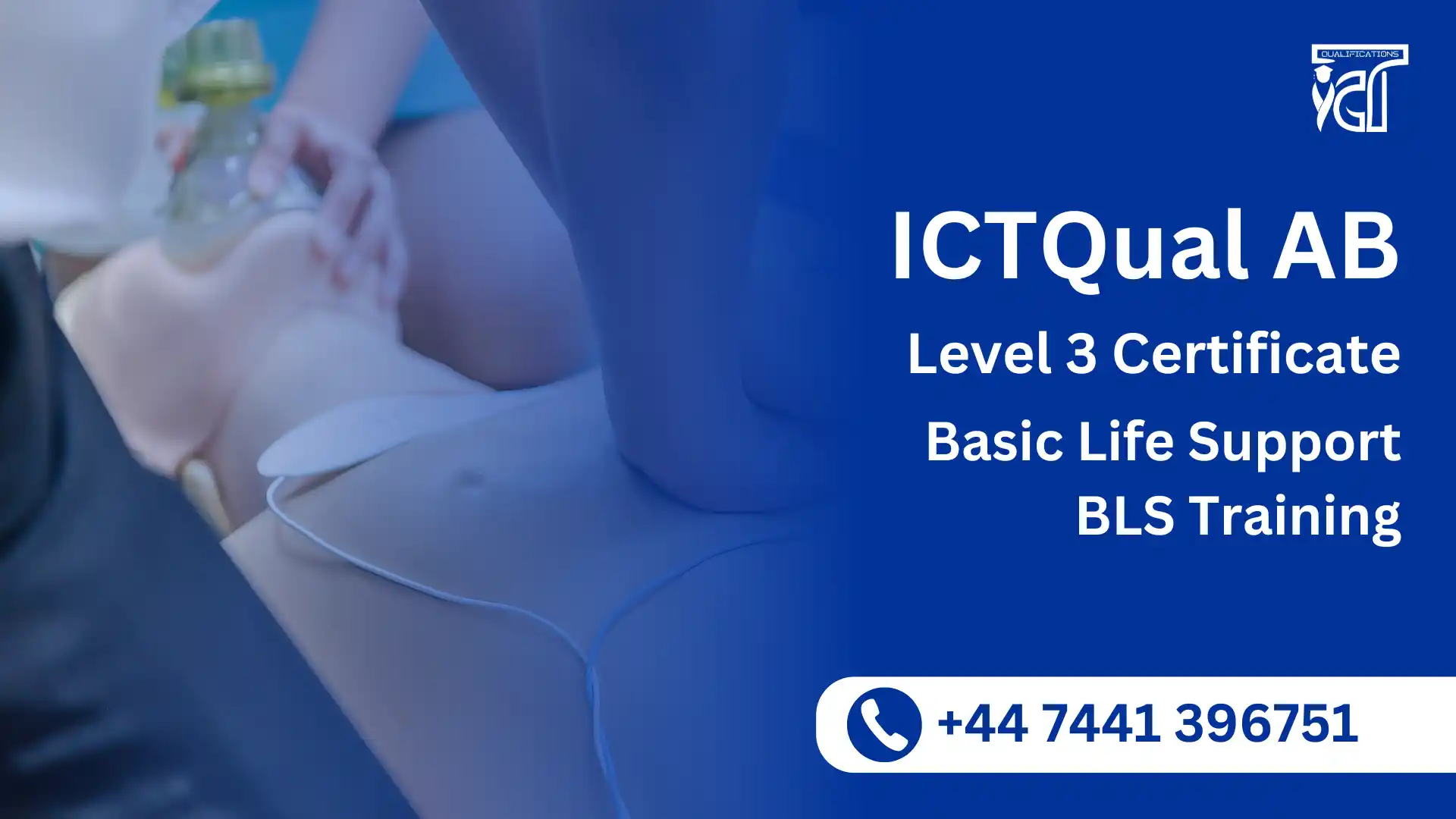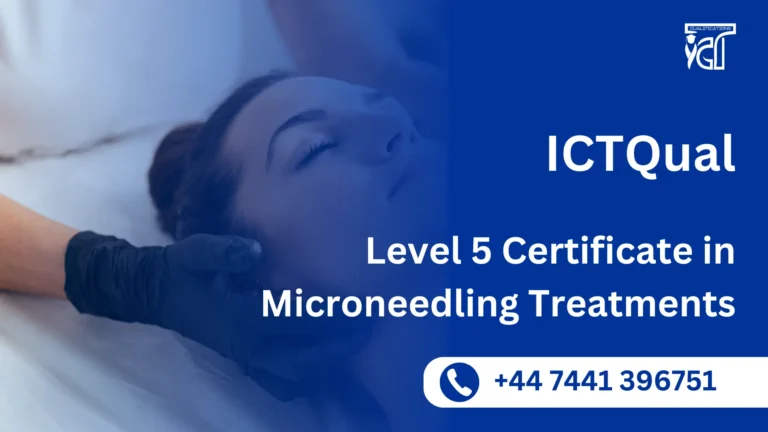The ICTQual AB Level 3 Certificate in Basic Life Support (BLS) Training is an advanced qualification designed to equip learners with comprehensive life-saving skills necessary to handle a wide range of emergency medical situations confidently and effectively. This course builds upon foundational BLS knowledge and focuses on enhancing practical competencies in providing immediate care during life-threatening incidents such as cardiac arrest, choking, severe bleeding, and respiratory distress.
Learners will develop advanced skills in performing high-quality Cardiopulmonary Resuscitation (CPR), using Automated External Defibrillators (AED), managing airway obstructions, and handling shock and unconsciousness scenarios for both adult and pediatric patients. The course also introduces participants to the principles of first aid in trauma cases and emergency response protocols applicable in various environments such as workplaces, healthcare settings, educational institutions, and public spaces.
The ICTQual AB Level 3 Certificate in BLS Training is ideal for individuals in roles where advanced emergency preparedness is essential, including healthcare workers, emergency responders, teachers, fitness instructors, and safety personnel. It also serves as a valuable qualification for anyone seeking to take on greater responsibility in ensuring the health and safety of others in both professional and community settings.
Upon successful completion, participants will receive an internationally recognized certification that demonstrates their competence in advanced Basic Life Support techniques and emergency response, enhancing their career prospects and readiness to act in critical situations.
ICTQual AB Level 3 Certificate in Basic Life Support BLS Training
The ICTQual AB Level 3 Certificate in Basic Life Support BLS Training qualification consists of 6 units and 12 Credits for the complete qualification.
- Advanced Life Support Protocols
- Rapid Assessment and Decision-Making
- Management of Cardiac and Respiratory Arrest
- Trauma Care: Fractures, Burns, and Wounds
- Pediatric and Geriatric Life Support Considerations
- Leadership and Coordination in Emergency Response
GLH (Guided Learning Hours) and TQT (Total Qualification Time) are terms commonly used in vocational qualifications to help define the amount of time a learner is expected to spend on their studies.
1. GLH (Guided Learning Hours)
GLH refers to the number of hours a learner spends being directly taught, supervised, or supported during their course. This includes the time spent in activities such as:
- Classroom instruction
- Practical workshops
- One-on-one tutoring or mentoring sessions
- Online learning sessions with tutor support
In other words, GLH represents the time that learners are actively engaged with their instructors or learning activities.
2. TQT (Total Qualification Time)
TQT represents the total amount of time a learner is expected to invest in completing a qualification, including:
- GLH (Guided Learning Hours): Time spent on direct learning, as explained above.
- Self-Directed Learning: This includes time spent on independent study, research, assignment completion, preparation for exams, and any other work the learner does outside of direct teaching hours.
TQT is a broader measure that includes all the time required to achieve the qualification. It helps learners and employers understand the overall commitment required for the qualification.
Key Differences Between GLH and TQT:
- GLH focuses on direct learning with guidance or supervision.
- TQT includes GLH as well as independent study time and other learning-related activities.
Example:
If a qualification has a TQT of 600 hours and a GLH of 250 hours, it means the learner should spend 250 hours in direct learning (classroom, online, or tutor-led sessions) and 350 hours on independent study or research.
Here are the learning outcomes for each study unit:
Advanced Life Support Protocols
- Understand the principles and guidelines of advanced life support (ALS) in emergency situations.
- Learn how to integrate advanced airway management, defibrillation, and medication administration in life-threatening conditions.
- Develop proficiency in recognising and responding to deteriorating patient conditions requiring ALS interventions.
Rapid Assessment and Decision-Making
- Learn how to conduct a systematic and time-sensitive assessment of critically ill or injured individuals.
- Develop decision-making skills to prioritise interventions based on patient condition and severity.
- Understand the importance of early recognition of clinical deterioration and effective escalation of care.
Management of Cardiac and Respiratory Arrest
- Gain expertise in performing high-quality cardiopulmonary resuscitation (CPR) following advanced life support protocols.
- Learn how to effectively use automated external defibrillators (AEDs) and manual defibrillation techniques.
- Understand post-resuscitation care strategies, including monitoring and stabilisation of the patient.
Trauma Care: Fractures, Burns, and Wounds
- Identify different types of trauma, including fractures, burns, and wounds, and their appropriate emergency management.
- Learn advanced techniques for haemorrhage control, wound dressing, and fracture stabilisation.
- Understand the role of trauma assessment tools in guiding effective treatment decisions.
Paediatric and Geriatric Life Support Considerations
- Recognise age-specific variations in life support interventions for paediatric and geriatric patients.
- Learn how to modify CPR, airway management, and medication administration based on patient age and physiological differences.
- Develop an understanding of common medical emergencies in children and older adults and their appropriate management.
Leadership and Coordination in Emergency Response
- Develop leadership skills necessary for managing emergency situations effectively.
- Learn how to coordinate a multi-disciplinary response, ensuring clear communication and task delegation.
- Understand crisis management principles and how to maintain control in high-pressure environments.
Benefits of the ICTQual AB Level 3 Certificate in Basic Life Support BLS Training
Advanced Life-Saving Skills
Learners will acquire comprehensive skills in delivering high-quality CPR, using Automated External Defibrillators (AED), managing airway obstructions, and handling severe bleeding and shock for both adults and children.
Improved Emergency Preparedness
Participants will gain the confidence and competence to respond promptly and effectively during various life-threatening emergencies, potentially saving lives in critical situations.
Internationally Recognized Certification
Successful completion of the course results in an internationally recognized Level 3 Certificate in Basic Life Support, enhancing employability and professional credibility across multiple sectors.
Suitable for Various Sectors
The course is designed for individuals from healthcare, education, fitness, childcare, security, and other sectors where emergency readiness is essential.
Compliance with Workplace Health & Safety Requirements
Helps organizations meet occupational health and safety standards by ensuring staff are trained and prepared for emergency medical situations.
Hands-On Practical Training
Includes realistic simulations and scenario-based exercises to develop practical skills that can be confidently applied in real-life emergencies.
Foundation for Further Medical or First Aid Training
Provides a solid base for learners who wish to pursue more advanced first aid, healthcare, or emergency medical qualifications.
Enhances Personal Responsibility and Community Safety
Empowers individuals to take proactive roles in ensuring the safety and well-being of family, colleagues, and community members during emergencies.
Boosts Career Prospects
Possessing a Level 3 BLS Certificate can open doors to various roles in health and safety, childcare, fitness instruction, teaching, and public service.
Who is the ICTQual AB Level 3 certificate in Basic Life Support BLS Training Best Suited For?
This course is ideal for:
✔ Healthcare Professionals and Support Staff
Nurses, paramedics, medical assistants, and other healthcare personnel who require advanced BLS skills to respond effectively in emergency situations.
✔ Teachers and Childcare Providers
Educators, school staff, and childcare workers responsible for the safety and well-being of children and young people in schools, nurseries, and daycare settings.
✔ Fitness Instructors and Sports Coaches
Individuals working in fitness centers, gyms, and sports facilities who may need to respond to medical emergencies during physical activities.
✔ Workplace Safety Officers and Employees
Professionals tasked with ensuring workplace health and safety who want to be fully prepared for medical emergencies in their organization.
✔ Emergency Responders and Security Personnel
Firefighters, police officers, lifeguards, and security staff who must have life-saving competencies as part of their job responsibilities.
✔ Family Caregivers
Family members looking after elderly, disabled, or medically vulnerable individuals who wish to be equipped to handle emergencies at home.
✔ Community Volunteers and First Aiders
Individuals volunteering in community service, public events, or disaster response who need certified BLS knowledge and skills.
✔ Anyone Seeking Personal Preparedness
Members of the general public who want to gain life-saving skills to confidently assist in emergencies occurring at home, work, or in public spaces.
Entry Requirements
Register Now
Qualification Process
Qualification Process for the ICTQual AB Level 1 Diploma in Basic Life Support BLS Training
- Self-Assessment:
Begin by evaluating your eligibility to ensure you meet the qualification requirements, including work experience, knowledge, and language proficiency. - Registration:
Complete your registration by submitting the required documents, including a scanned copy of a valid ID, and paying the registration fee. - Induction:
An assessor will conduct an induction to confirm your eligibility for the course and explain the evidence requirements. If you do not meet the criteria, your registration will be canceled, and the fee will be refunded. - Assignmnets & Evidence Submission:
Provide all assignmnets and the necessary evidence based on the assessment criteria outlined in the course. If you are unsure of the required evidence, consult with the assessor for guidance on the type and nature of evidence needed. - Feedback and Revision:
The assessor will review your submitted evidence and provide feedback. Evidence that meets the criteria will be marked as “Criteria Met,” while any gaps will be identified. You will be asked to revise and resubmit if needed. - Competence Evidence:
Submit final evidence demonstrating that all learning outcomes have been met. This evidence will be marked as “Criteria Met” by the assessor once it is satisfactory. - Internal Quality Assurance (IQA):
The Internal Quality Assurance Verifier (IQA) will review your evidence to ensure consistency, quality, and compliance with standards. - External Verification:
The IQA will submit your portfolio to ICTQUAL AB External Quality Assurance Verifiers (EQA) for final confirmation. The EQA may contact you directly to verify the authenticity of your evidence. - Certification:
Upon successful completion of all checks, ICTQUAL AB will issue your official certificate, confirming that you have attained the ICTQual AB Level 1 Diploma in Basic Life Support BLS Training.







